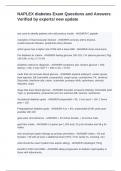NAPLEX diabetes Exam Questions and Answers
Verified by experts/ new update
test used to identify patients who still produce insulin - ANSWER-C peptide
examples of macrovascular disease - ANSWER-coronary artery disease,
cerebrovascular disease, peripheral artery disease
which group has a higher risk of DM with a lower BMI - ANSWER-Asian Americans
Pre diabetes dx criteria - ANSWER-fasting glucose 100-125; 2 hr plasma glucose (75g)
140-199; or A1c 5.7-6.4%
Diabetes criteria for diagnosis - ANSWER-symptoms plus random glucose > 200;
fasting > 126; 2 hour OGTT > 200 or A1c > 6.5%
meds that can increase blood glucose - ANSWER-atypical antipsych, azoles (posa),
beta agonists, BB (carvedilol, propranolol), cough syrup, cyclosporine, FK, sirolimus,
Diazoxide, interferon alfa, niacin, octreotide, protease inhib, quinolones, steroids,
thiazides, loops
drugs that lower blood glucose - ANSWER-linezolid, lorcaserin (Belviq), Octreotide (with
Type 1), pentamidine, propranolol and non-selective BB, Quinine, quinolones
Gestational diabetes goals - ANSWER-preprandial < 95; 1 hour post < 140, 2 hours
post < 120
Pregestational diabetes goals - ANSWER-A1c < 6%, preprandial 60-99, peak post-
prandial 100-129
goal waist circumference - ANSWER-< 35 inches female; < 40 inches male
goal fiber intake - ANSWER-14 grams per 1,000 kcal; 25 g for females and 38 g for
males
who should get aspirin therapy as primary prevention - ANSWER-males > 50 and
females > 60 with at least 1 additional factor (HTN, CVD, family hx, smoking, etc)
what should be used if patient has aspirin allergy - ANSWER-clopidogrel 75mg
benefit of ACEI and ARBs - ANSWER-delay progression to diabetic nephropathy in
those with albuminuria
, when do patients qualify for high intensity statin - ANSWER-<40 years with overt CVD
or >40 year with CVD risk factors or overt CVD
vaccinations indicated for diabetic patients - ANSWER-Hep B if unvaccinated between
19-59; influenza, pneumococcal; Tetanus if due
ADA guidelines - ANSWER-< 7%, preprandial 80-130; peak post-prandial < 180
AACE guidelines - ANSWER-< 6.5%, preprandial < 110, peak post-prandial < 140
when should initial therapy contain two drugs - ANSWER-A1c >/= 9
when should initial therapy include insulin - ANSWER-A1c > 10 or BG > 300
at one point should an additional agent be added - ANSWER-A1c not at goal after 3
months
which three drug regimens are not recommended - ANSWER-metformin + DPP4 +
GLP1 or metformin + SGLT2 + GLP1
medications with only moderate efficacy - ANSWER-DPP4 inhib, SGLT2 inhib,
pramlintide
moderate risk of hypoglycemia - ANSWER-SU adn meglitinides
drugs that can cause weight loss - ANSWER-GLP1 agonists, SGLT2 inhib, primlintide
drugs that cause weight gain - ANSWER-insulin, SUs, meglitinides, TZDs
which medications increase insulin secretion - ANSWER-SUs and Meglitinides
how does metformin work - ANSWER-decreases hepatic glucose production, decreases
glucose absorption, and increases sensitivity
when is metformin CI - ANSWER-Scr > 1.5 in males, > 1.4 in females
Metaglip - ANSWER-metformin and glipizide
Glucovance - ANSWER-metformin and glyburide
Actoplus Met - ANSWER-pioglitazone and metformin
Avandamet - ANSWER-rosiglitazone and metformin
Janumet - ANSWER-sitagliptin and metformin
Kombiglyze - ANSWER-saxagliptin and metformin




